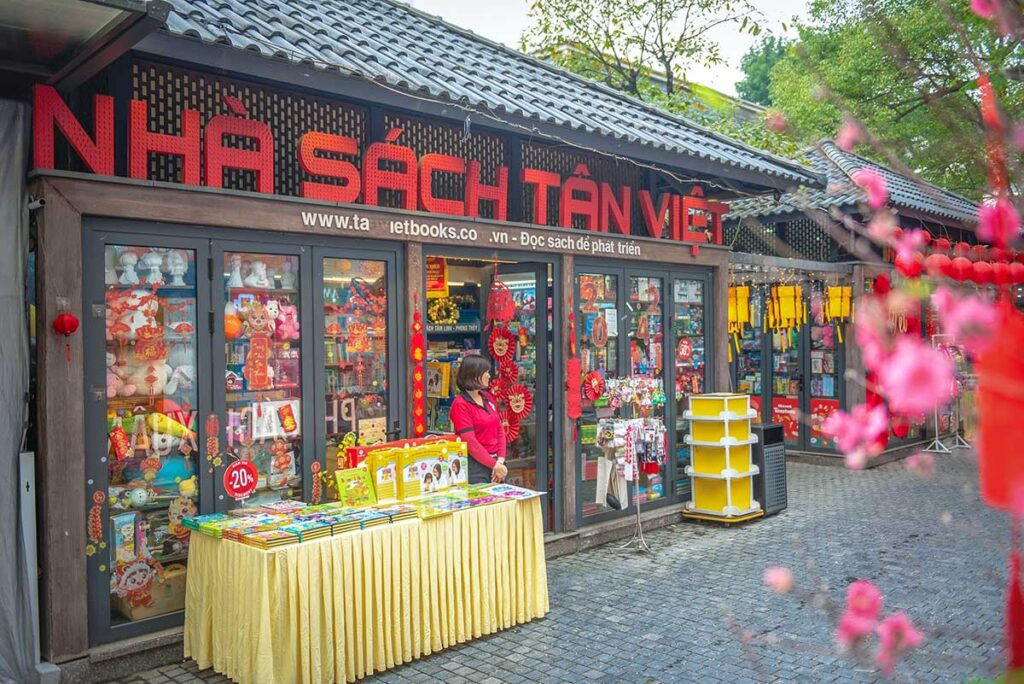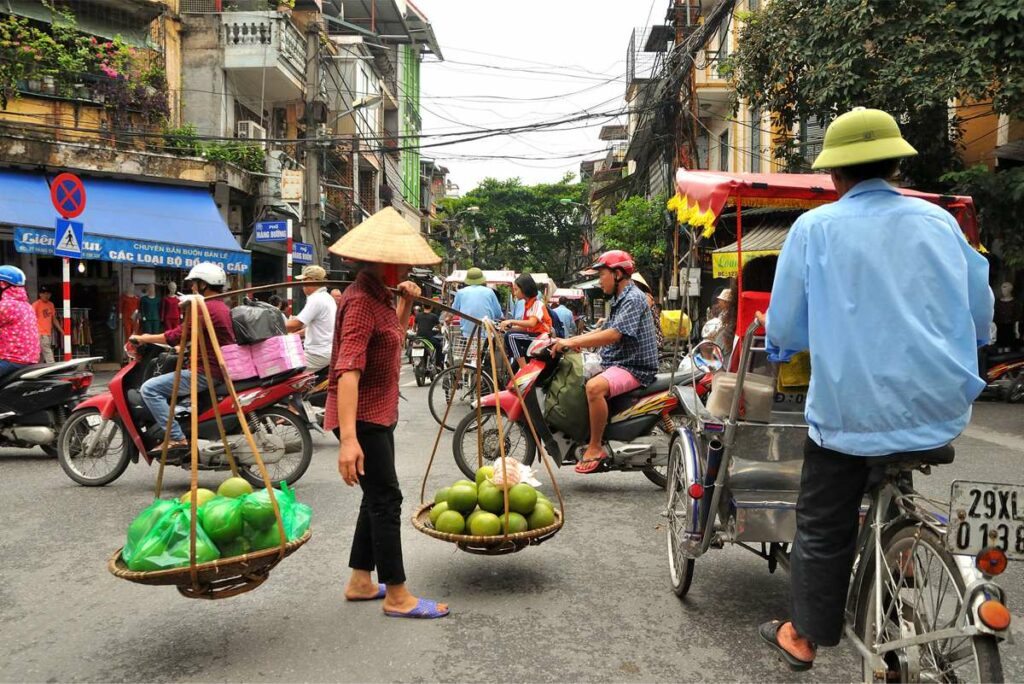What is Hanoi Book Street like?
Hanoi Book Street is a peaceful pedestrian zone lined with small wooden book booths, shaded by tall trees and dotted with benches and cafés. It feels more like a quiet park path than a shopping street — a place where you can slow down, flip through a book, and watch locals sip coffee or take selfies with murals and seasonal displays.
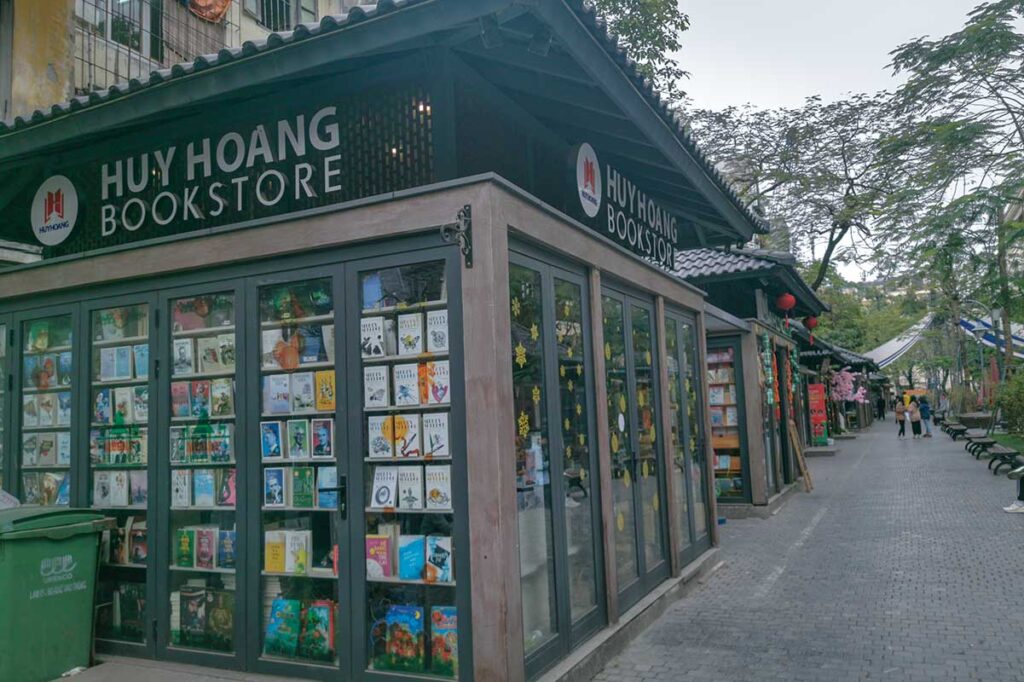
The street officially opened in 2017, but its past goes much deeper. Once the site of a wartime graveyard and later a market nicknamed the “underground market,” it was redeveloped by the city to preserve the area’s history and offer something culturally meaningful. Today, it’s not only a relaxing spot to browse books, but also a venue for book festivals, community events, and a reflection of Vietnam’s evolving reading culture — especially among the younger generation.
Visiting information
Location & Address
Hanoi Book Street is officially located on 19/12 Street in Hoan Kiem District, just south of Hoan Kiem Lake in the French Quarter. On Google Maps, it’s often marked as “Phố Sách Hà Nội”, which simply means Hanoi Book Street in Vietnamese. You can find it here:
The street connects Ly Thuong Kiet Street and Hai Ba Trung Street, next to the imposing Supreme People’s Court — a colonial-era building you’ll recognize by its yellow façade and tall columns.
How to get there
On foot:
If you’re staying in the Old Quarter, getting here on foot is very doable. The walk is about 1 to 1.5 kilometers, depending on your starting point, but it can easily become part of a relaxing sightseeing route.
You have two pleasant options:
- Walk along the west side of Hoan Kiem Lake, passing Thap Rua (Turtle Tower) and the tree-lined Le Thai To Street.
- Or head down P. Nha Chung Street, passing by St. Joseph’s Cathedral and the lively area around “lemon tea street” — a local nickname for the hangout spots near the church.
By taxi or Grab:
For a quicker option, just book a Grab car or motorbike, or hail a metered taxi. From most central hotels, it’s a 5 to 10-minute ride depending on traffic. Drop-off is easiest on Hai Ba Trung Street, where the entrance to Book Street is clearly marked.
By cyclo:
If you want to add a cultural touch to your trip, consider taking a cyclo (cycle rickshaw) for the short ride — especially if you’re near the lake or the French Quarter. It’s slow but scenic, and perfect for soaking in Hanoi’s street life.
Highlights of visiting Hanoi Book Street
1. Browse bookstores from top Vietnamese publishers

Hanoi Book Street is home to around 20 small bookstores and publisher stalls, many of them representing major Vietnamese names like Kim Dong, Nha Nam, Tien Phong, Phuong Nam, and Fahasa. Most of the books are in Vietnamese, covering genres from children’s literature and poetry to business, philosophy, and Vietnamese history.
That said, a handful of shops do stock a small but decent selection of English-language books, especially translations of Vietnamese novels and popular international titles. If you enjoy browsing or want to pick up a unique souvenir, it’s easy to spend time flipping through titles, even if you don’t read Vietnamese.
2. Enjoy a relaxing café or reading spot
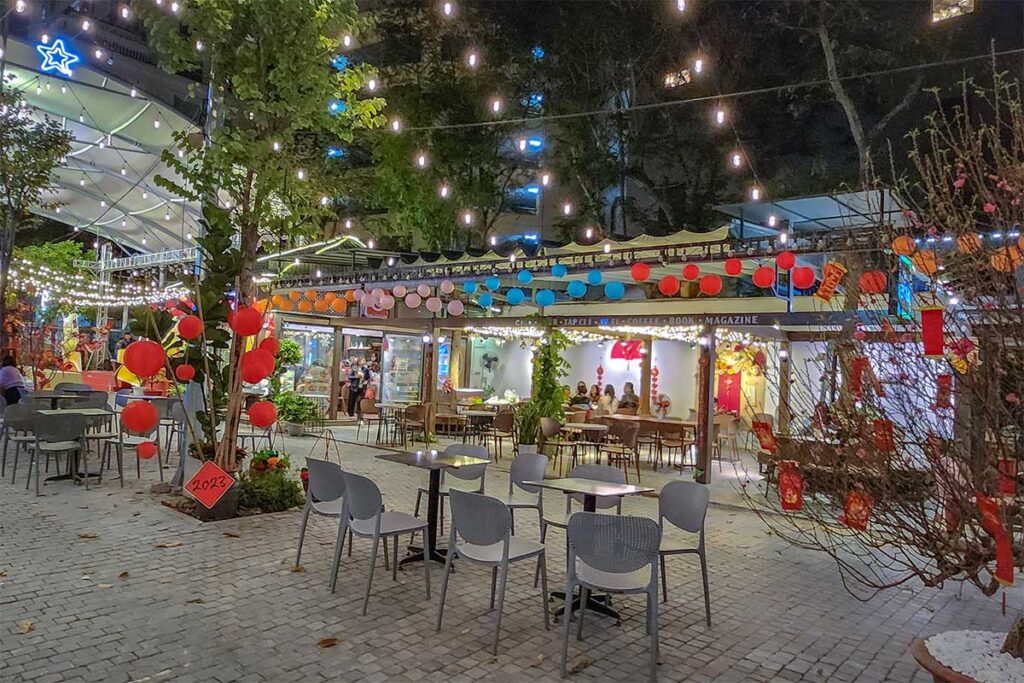
One of the nicest things about Hanoi Book Street is that it’s not just about shopping — it’s also designed as a place to slow down. The tree-lined path offers plenty of shade, with benches scattered along the route and a few cafés where you can grab a drink and unwind.
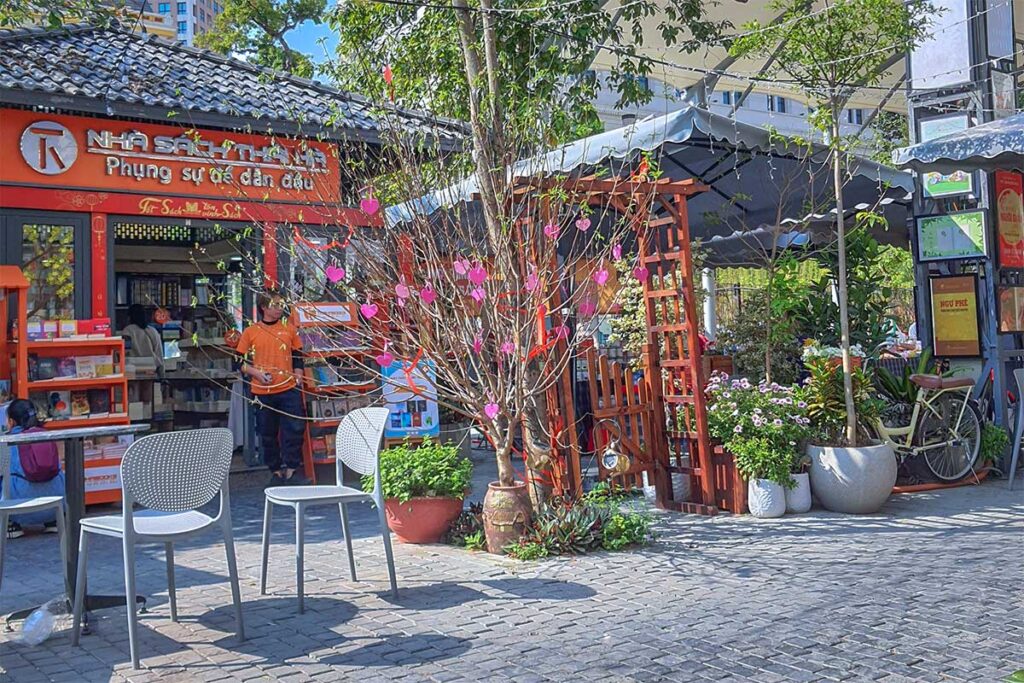
Whether you’re escaping the midday sun, taking a break from sightseeing, or waiting for a friend, it’s a calm space to relax with a coffee and a book. Some bookshops even have reading corners, inviting you to sit and skim a few pages before deciding what to buy.
3. Look out for cultural events & Book festivals
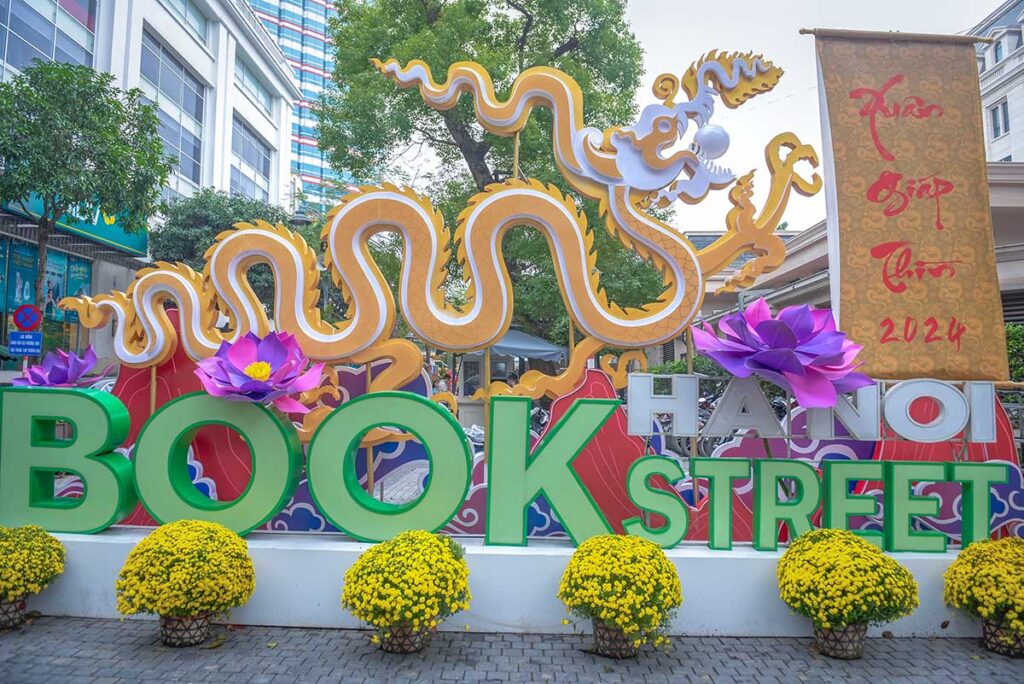
Beyond the daily quiet, the street also hosts regular events that bring it to life — especially on weekends and public holidays. You might stumble upon a book signing, children’s workshop, live reading, or a themed display depending on the time of year.
The biggest event is the Tet Book Festival, held around Lunar New Year, when the street is decorated with red banners, flowers, and traditional motifs. There are also likely events during occasions like the Mid-Autumn Festival and Vietnamese Women’s Day, when the area sees more activity and “check-in” visitors. If you’re in Hanoi during a major holiday, it’s worth checking the schedule.
4. Experience modern Vietnamese ‘Check-In’ Culture
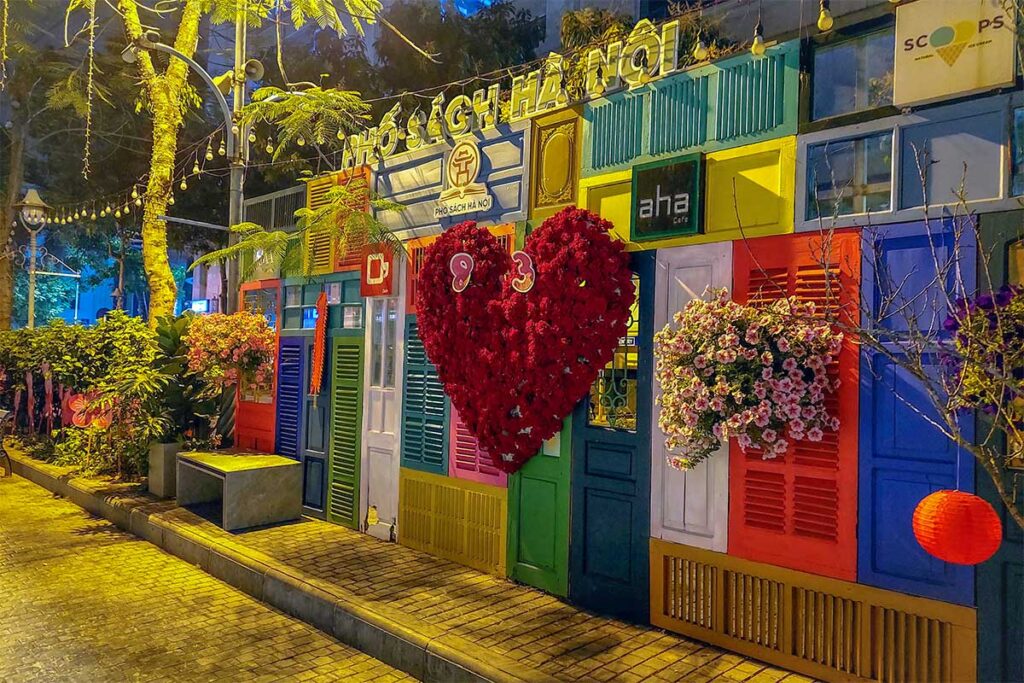
For locals, visiting Hanoi Book Street is as much about taking pictures as it is about books. The street has become a favorite “check-in” spot, part of a broader Vietnamese social media culture where people post stylish or seasonal photos at trendy or scenic places.
You’ll often see students or couples posing near murals, flower arrangements, or decorative signs, especially when the street is dressed up for holidays. While this might feel different from traditional cultural stops, it’s a good example of how modern Vietnamese youth blend leisure, aesthetics, and digital life — and it’s part of what makes this street feel alive.
5. A Calm and Cultural Break in the French Quarter
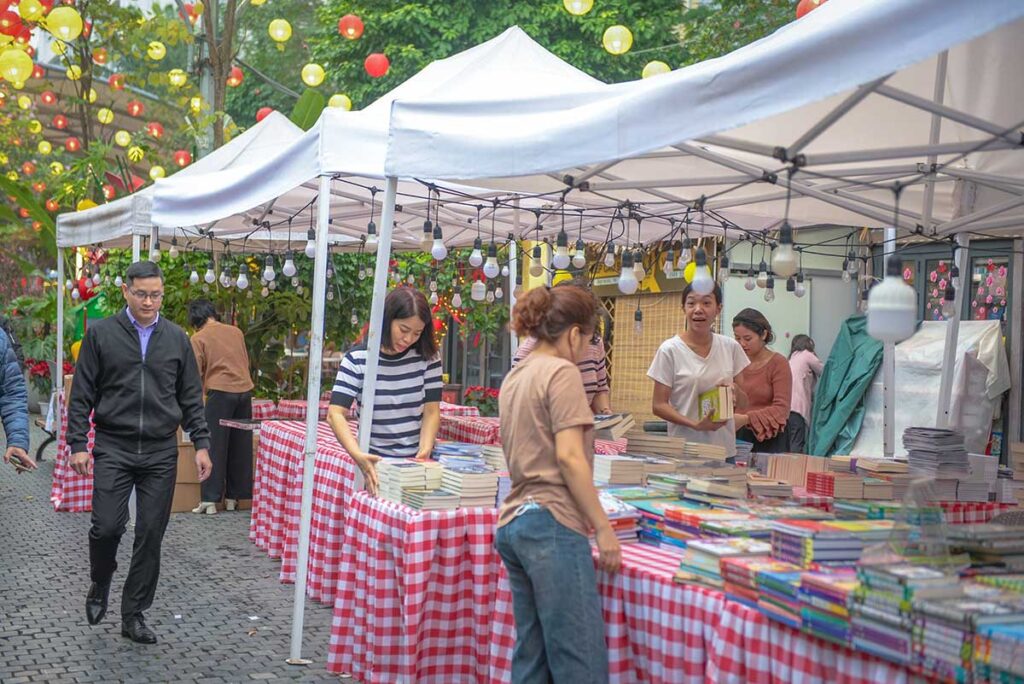
Even without buying a book or joining an event, Hanoi Book Street is simply a pleasant spot to pause while exploring the French Quarter. The buildings nearby — like the Supreme Court and Hoa Lo Prison — are rich in history, and the whole area has a slower, more refined pace than the Old Quarter.
With its blend of trees, colonial architecture, and soft buzz of activity, the street offers a small but meaningful cultural moment. Whether you’re walking between museums or just want somewhere peaceful to rest, this is a good place to catch your breath and enjoy a different side of Hanoi.
Nearby sights in the French Quarter
Hanoi Book Street is tucked into one of the most elegant parts of the city — the French Quarter, known for its leafy boulevards and colonial architecture. It’s not just about books here — there’s plenty to explore within walking distance.
Right next door is the Hoa Lo Prison Museum, one of the best things to do in Hanoi for anyone interested in Vietnam’s modern history. The Supreme Court building stands alongside it, and while it’s not open to visitors, its architecture is worth admiring.
Just a few blocks away, you’ll find the Vietnamese Women’s Museum, also housed in a colonial structure with well-curated exhibits about women’s roles in Vietnamese society. Continue farther and you’ll reach the grand Hanoi Opera House and the Vietnam National Museum of History, both within the same district.
For more ideas in this area, check out our full French Quarter Hanoi guide.
Is Hanoi Book Street worth visiting?
Hanoi Book Street isn’t as large or lively as its counterpart Ho Chi Minh City Book Street, but it has its own charm — clean, well-organized, and thoughtfully designed. It’s not a major attraction, but it works well as a short stop, especially if you’re already visiting nearby places like Hoa Lo Prison or walking through the French Quarter.
If you enjoy books, quiet corners, or casual people-watching, it’s a pleasant place to spend 20–30 minutes. Families with kids, expats, and travelers looking for a peaceful break from Hanoi’s busy streets will likely appreciate the calm setting. Just keep in mind: most books are in Vietnamese, and while English titles exist, the selection is limited — so it’s better to come for the atmosphere than for book shopping alone.
You probably wouldn’t travel across the city just to see it, but if you’re in the area, it’s a gentle cultural detour that adds texture to your Hanoi experience.
Dinh Le Book Street – Hanoi’s other literary spot
What is Dinh Le Book Street Like?
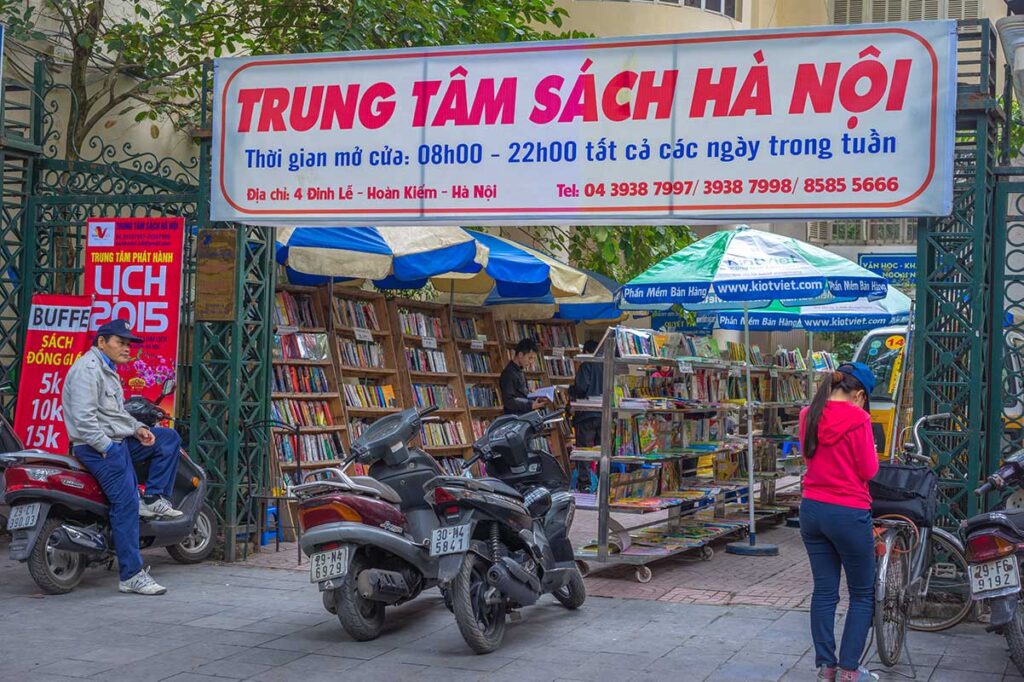

Just a short walk from Hanoi Book Street, Dinh Le Book Street is older, livelier, and far less polished — but in a good way. This is where Hanoi’s book-buying tradition really began, long before 19/12 Street was renovated. It’s a bit chaotic, with tightly packed shops, handwritten discount signs, and overflowing shelves, but that’s exactly what gives it character.

At the heart of it all is the famous Mao Bookstore, tucked away upstairs in a narrow alley. This humble spot is a local institution, known for its attic-like charm and floor-to-ceiling stacks of books. Dinh Le also has a small selection of secondhand books, and many shops offer discounts up to 50% off the cover price — especially on older or educational titles.
Location and Surroundings
Dinh Le Street is located in Hoan Kiem District, just southeast of Hoan Kiem Lake. It runs between Trang Tien Street and Ngo Quyen Street, near the Trang Tien Plaza shopping mall and the famous Trang Tien ice cream shop — a nostalgic stop for many Hanoi locals.
It’s also close to Ly Thai To Park, the Hanoi Opera House, and the Sofitel Legend Metropole Hanoi, all of which sit in the heart of the French Quarter. From here, you can walk easily to Hanoi Book Street (about 800 meters away), passing colonial-era landmarks and leafy streets along the way.
A great route would be to start your morning at Hoa Lo Prison, visit Hanoi Book Street, then continue on foot toward Dinh Le, making stops at Ly Thai To Park or the Opera House before looping back to Hoan Kiem Lake. It’s a relaxed and culturally rich walk through central Hanoi. Check this walking route on Google Maps.
Unique aspects of Dinh Le Book Street
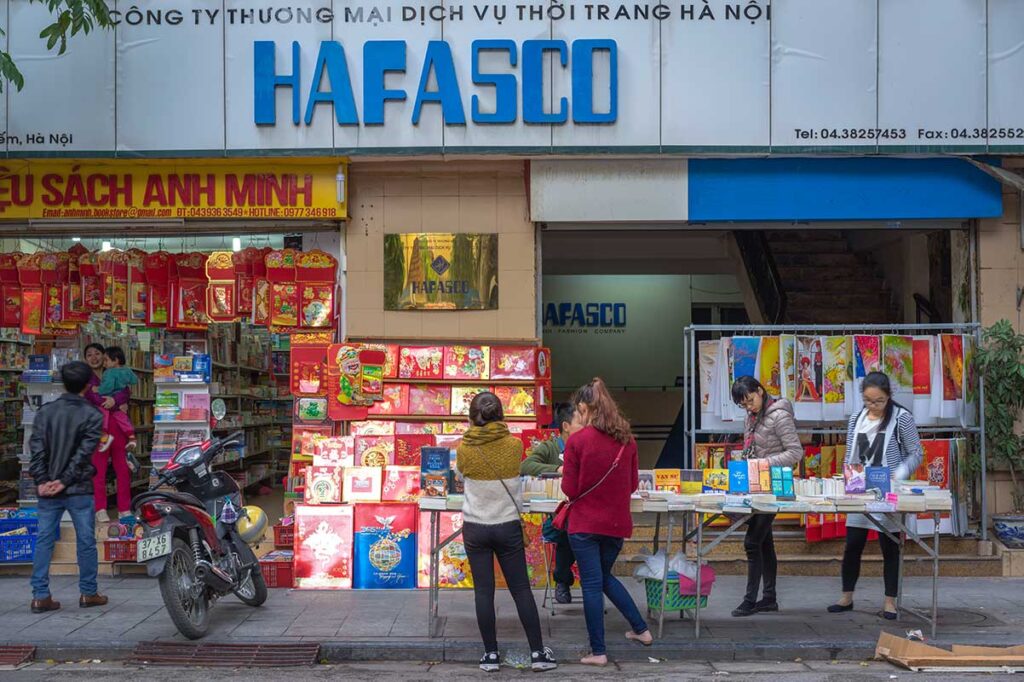
What makes Dinh Le special is its old-school atmosphere — the kind that feels unchanged for decades. Shops here don’t have the curated design of Hanoi Book Street, but you’ll find a wider mix of genres: from children’s books and test prep guides to spirituality, literature, rare finds, and cheap secondhand titles. It’s the kind of place where you dig for a gem, rather than browse neatly arranged shelves.
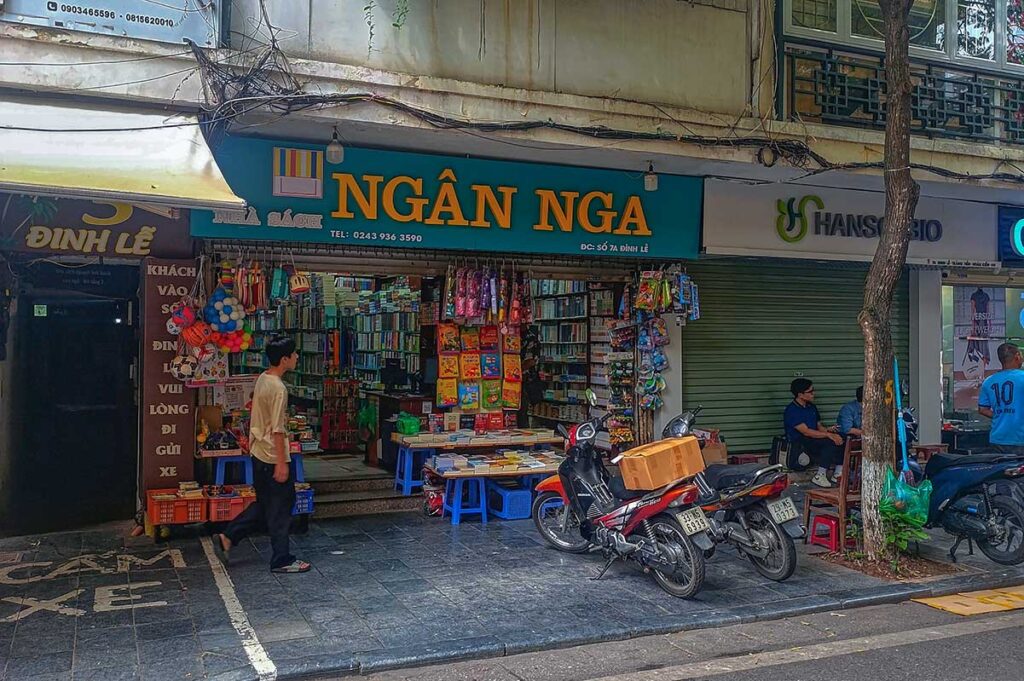
Mao Bookstore, on the second floor of No. 5 Dinh Le, remains the street’s soul. Founded in the 1990s by Ms. Pham Thi Mao, it has become a sanctuary for book lovers across generations. The shelves are dense, the aisles narrow, and the walls filled with notes, poems, and memorabilia — more than just a bookstore, it’s a piece of living Hanoi culture.
Compared to the newer, tidy setup of Hanoi Book Street, Dinh Le feels more authentic and less curated — which makes it especially appealing for readers and travelers who like places with a bit of soul.
